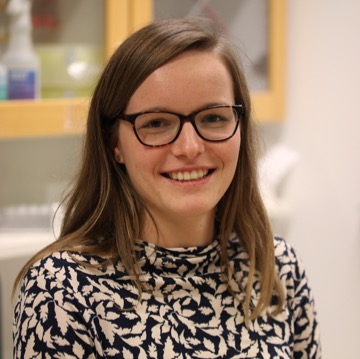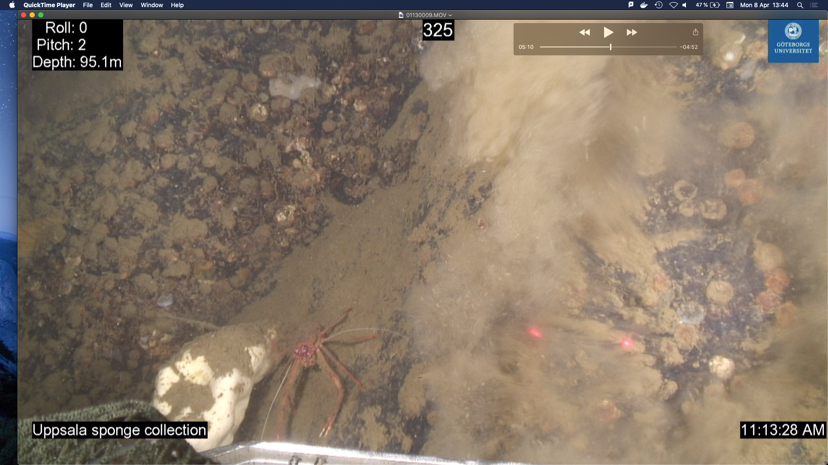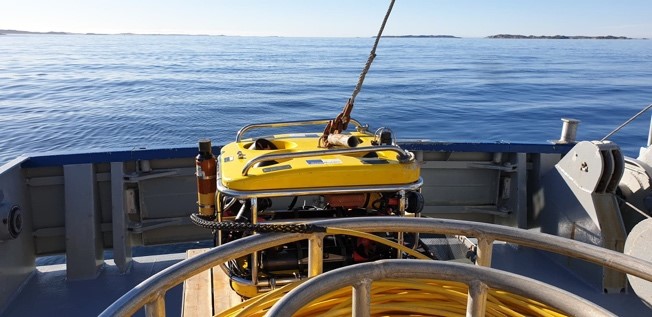 Karin Steffen, is a doctoral student at Uppsala University. She has a background in biology from Albert-Ludwigs University in Freiburg, Germany and Uppsala University, Sweden. For her doctoral studies, she investigates natural product diversity in a deep-sea sponge. To this end, Karin uses different “-omics” (genomics and metabolomcis) and explores computational tools to integrate big data. Karin Steffen will take part in the Soapbox Science event in Uppsala on 25 May. She will talk about “Do ancient animals hold future drugs?”
Karin Steffen, is a doctoral student at Uppsala University. She has a background in biology from Albert-Ludwigs University in Freiburg, Germany and Uppsala University, Sweden. For her doctoral studies, she investigates natural product diversity in a deep-sea sponge. To this end, Karin uses different “-omics” (genomics and metabolomcis) and explores computational tools to integrate big data. Karin Steffen will take part in the Soapbox Science event in Uppsala on 25 May. She will talk about “Do ancient animals hold future drugs?”
By Karin Steffen
I genuinely believe I have one of the best scientific jobs possible!
My job is a paid education, and allows me to be out on the sea for field work, to work with the latest high-end technologies in the lab for data collection and it stimulates me to develop computational and analytical skills. On top of that, it comes with recurring opportunities to be awarded travel stipends and reach out with my work on conferences all over the world.
My name is Karin and I am a PhD student in pharmacognosy.
How does this this go together and what does it actually mean?
Pharmacognosy is the study of natural products. That is, chemical compounds with bioactivity that are found in nature. This is where the field work comes in. In order to get my samples, the research group I’m part of goes out by boat to find deep-sea marine animals called sponges (think: Spongebob Squarepants). While quite exhausting work at times, field work takes me to places of utter beauty that I hardly could access otherwise.


Left: At the Swedish West coast, the ROV (sampling robot) on board the research vessel Nereus. Right: Sampling in action: same place at 95 m depth, showing the metallic edge of the ROV with the net for collecting the white sponge, which is guarded by a squat lobster.
Getting back to the science: Bioactive chemical compounds are very interesting, as they have the potential to become future drugs. And indeed, finding “drugs” in nature is far more likely than from random synthetic chemical “libraries”, big collections of compounds to be tested.
In order to get to the chemistry in my sponges, I use mass spectrometry (instruments that are able to detect individual molecules. How mind-blowing is that?!??!?!?!) and genome sequencing (a.k.a. the stuff you otherwise hear in the news about! I get to do it!).
But with all these technologies come heaps and heaps of data. Thus, enter the final challenge: making sense of it. While overwhelming at first, to me, the data analysis is much like a treasure hunt. With my knowledge and hypotheses about the data, I get to unravel the mystery of the endless sheets of numbers, (hopefully) leading to the answers we were out after.
Let’s be real for a second: Science can be really frustrating when things don’t work out. Which they often don’t. But you have to remember that that is not a surprise. After all, as scientists, our job is to find out things nobody knows yet or develop methods nobody has tried out yet. But I think, when it the right dose, it reminds us that we’re fortunate to develop and discover new things. We scientists contribute to society, for instance with knowledge about new drugs and unknown organisms (did you know about sponges before?). Being able to grow as a scientist and at the same time make a difference for the future is my daily reward that I am thankful for.
